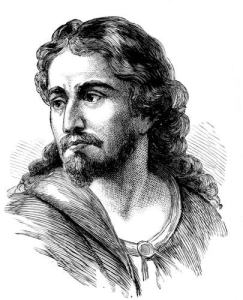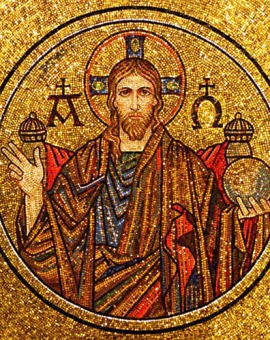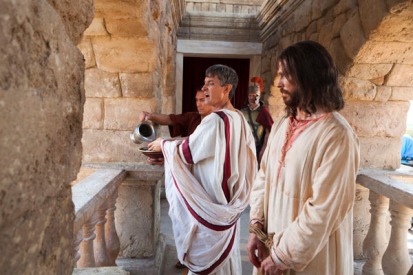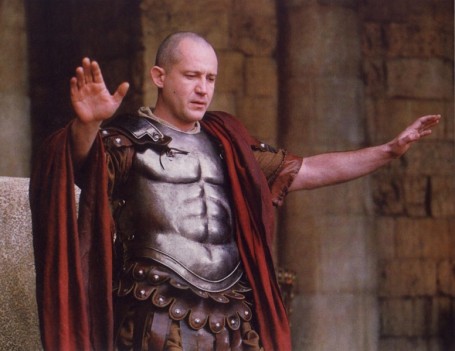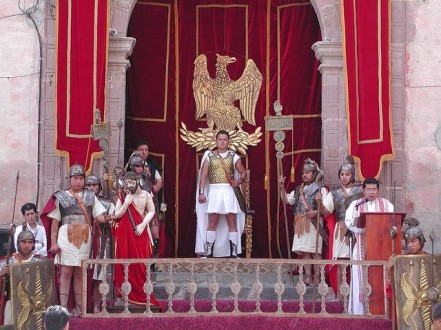One of my favorite parts of reading any piece of literature is learning about the different characters that are being depicted. I love having his or her background information, and if there is none available, then I just have to look it up for myself.
In the very first chapter of the Book of Acts, Peter stands up among the other disciples and tells them that another 12th disciple must be chosen to replace Judas Iscariot. He states the criteria for being chosen:
So one of the men who have accompanied us during all the time that the Lord Jesus went in and out among us, 22 beginning from the baptism of John until the day when he was taken up from us—one of these men must become with us a witness to his resurrection.” 23 And they put forward two, Joseph called Barsabbas, who was also called Justus, and Matthias. 24 And they prayed and said, “You, Lord, who know the hearts of all, show which one of these two you have chosen 25 to take the place in this ministry and apostleship from which Judas turned aside to go to his own place.” 26 And they cast lots for them, and the lot fell on Matthias, and he was numbered with the eleven apostles. (Acts 1:21-26, ESV)
So, my question is: Who was Matthias, and why was he chosen to replace Judas Iscariot as the 12th Disciple?
Starting with the first part of my question, I wanted to first ask, who exactly was he?
Many of the other sources reiterated this same tale, along with the fact that he had traveled with Jesus since the beginning. This seemed pretty simple, but then one source has this to say about him:
I think it would be a pretty darn cool story if he really was Zacchaeus, especially when you consider the story of the “rich young man” who also came to Jesus asking what he had to do to enter Heaven. If this story is true, then it would mean that not only did a rich man (a big, bad tax collector) sell his possessions to give to the poor, but he eventually “rose through the ranks”, as it were, and stepped up to fill in Judas’ position as the 12th Disciple. This is in contrast with the young man, who valued his possessions and position more than the prospect of selling his things and following Jesus. Of course, this runs a bit contradictory to the prospective 12th disciple having to have been there since the baptism. Certainly Zacchaeus/Matthias could have been there for the Crucifixion, after the resurrection, and for the ascension, but I highly doubt that he was there for Jesus’ baptism.
After I got some background information on him, I then wanted to know: Why him? What made him and Barsabbas the two main candidates for the 12th disciple? According to Acts, Peter said that the person chosen had to have been with Jesus from the beginning, from His baptism to His Ascension into Heaven. Apparently, the only two people who fit that criteria were Matthias and Barsabbas, which really made me wonder if there were no others who had been there from the beginning. Neither the Bible, nor any of the sources that I happened upon offered any real answer to this, however.
After naming the two men, the disciples prayed to the Protagonist, then cast lots to see which one Yahweh wanted to be the 12th. This seemed pretty funny to me, since it would be the Biblical equivalent of doing rock-paper-scissors to see who would be one of the Apostles.
Of course, you can look at this two ways. From the mind of a believer, well of course Yahweh’s will was for him to be the 12th! If He didn’t, then he wouldn’t have been chosen. From the eyes of a skeptic, though, it looks like this bunch of dudes seriously just played rock-paper-scissors to see who would be chosen.
I was also very curious to see if he had written anything himself, if there was a “Gospel of Matthias” somewhere.
Another source echoes this, saying:
“He was traditionally the author of the “Gospel of Matthias,” a heretical work.”
Okay, now, my question morphed into: What did he do after he was chosen? We hear so much about Peter, Paul, John, etc., but Matthias is not ever mentioned again in the Bible.
One thing that all the sources can agree on is that Matthias became a martyr. There is no definitive evidence of where, how, and when Matthias died, but in my research, there are two main supposed stories of how he reportedly died.
He was either crucified in Colchis OR he was tried and sentenced to be stoned to death by the Jews, who then beheaded him in order to make it look like he was an enemy of Rome. (New Advent)
From the sources that I read, it seems like although there is not extensive writing pertaining to his specif works during his missions, it’s fair to say that his life after the Ascension followed the pattern of many of the other apostles: he goes out on his journey, he converts some people, he makes some people mad, he gets thrown in jail (at least once), and he is eventually martyred. He really does seem like a very interesting individual, and it’s kinda sad to see that he is so often looked over or completely forgotten in the shadow of the more well-known Apostles like Paul and Peter.
